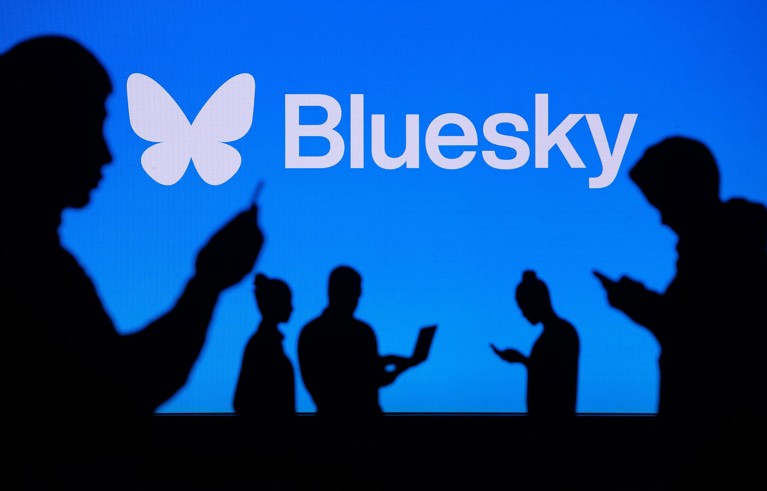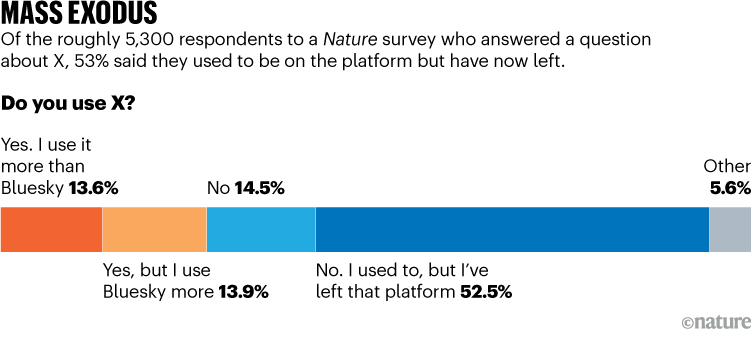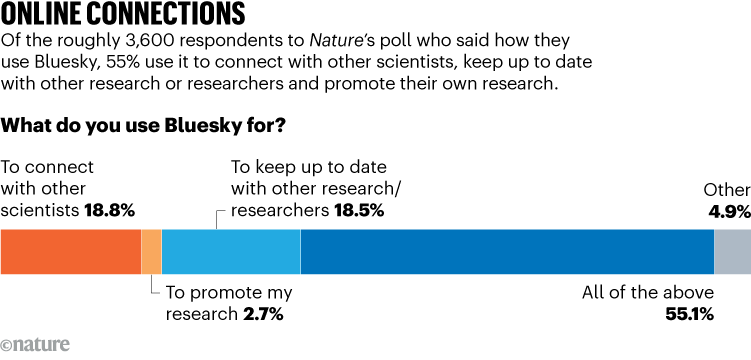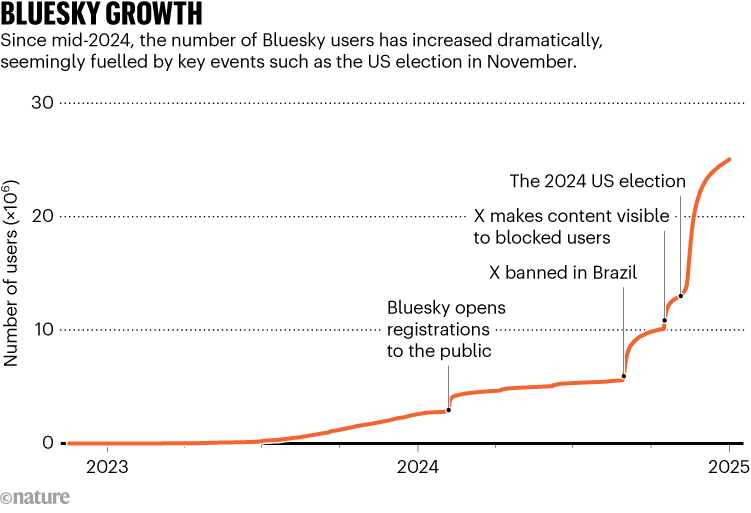
Social-media platform Bluesky has more than 27 million users.Credit: Peter Kováč/Alamy
Seventy per cent of Nature readers who responded to an online poll are using the social-media platform Bluesky, which works a lot like X (formerly Twitter) and whose popularity has soared in recent months, in particular since the November US election.
Although the survey is not statistically representative of Nature readers or the scientific community at large, it echoes recent enthusiasm for Bluesky among researchers and disillusionment with X. Of roughly 5,300 readers who responded to a question about X, 53% said they used to be on X but have now left (see ‘Mass exodus’).

Source: L. Balduf et al. Preprint at arXiv https://doi.org/10.48550/arXiv.2501.11605 (2025)
“Bluesky is much better for science. There is much less toxicity, misinformation, and distractions,” wrote one respondent. “My feed is almost entirely scientists and I actually get updates on research that is relevant and timely,” wrote another.
Bluesky now has more than 27 million users and is broadly similar in functionality and user experience to X, which for a long time was a go-to platform for scientists to discuss and disseminate their work. X fell out of favour with some after entrepreneur Elon Musk purchased the tool in October 2022.
In Nature’s survey, 55% of respondents to the question ‘What do you use Bluesky for?’ said it was a mix of three research-related activities: to connect with other scientists, keep up to date with other research or researchers, and promote their own research (see ‘Online connections’).

Source: L. Balduf et al. Preprint at arXiv https://doi.org/10.48550/arXiv.2501.11605 (2025)
In total, almost 6,000 readers responded to Nature’s poll, which ran from 14 to 17 January 2025. We solicited responses on the Nature website, on social media and in the Nature Briefing, an e-mail newsletter. Of the almost 5,000 respondents who answered a question about their work, 85% — or 3,970 — said that they were working scientists. A similar number responded to a question about their field of study: 38% said they worked in biological sciences, 11% in computing or information sciences, 9% in physical sciences and 9% in environmental sciences. Answers came from scientists in 84 countries or regions, with the most coming from the United States (33%), followed by the United Kingdom (15%) and Germany (12%).
Positive vibes
Thousands of survey respondents wrote expressively about how they think Bluesky stacks up against X. “Bluesky compares beautifully so far. More civil and informed conversations,” wrote one. Other positive terms that respondents used to contrast the platform with X included more pleasant, more supportive, friendlier, kinder, nicer, more collegial, uplifting, more peaceful and safer.
A sense of safety is particularly valuable to researchers who teach or lead teams. “I feel that I can recommend it to students and trainees. I can’t do that for X, it is not a safe learning space,” wrote one respondent.
Some wrote that Bluesky is a better forum than X for discussing science, because debate there is more measured and more focused, with less hostility. “I find it much less antagonistic to science,” said one respondent.
But with less heated debate and fewer users than X, some find Bluesky boring. That could change if it continues to attract new users at pace (see ‘Bluesky growth’). “Was pretty sleepy until November 2024. Now there seems to be enough critical mass of researchers in my field to find new research and connect again,” wrote one respondent.

Source: L. Balduf et al. Preprint at arXiv https://doi.org/10.48550/arXiv.2501.11605 (2025)
Fewer fascists?
Other marks in Bluesky’s favour noted by survey respondents include the perception that there are fewer “Nazis” on the platform than on X, and less racism; that it is not owned or deemed to be influenced by Musk; and that it does not host advertisements.
X could not be reached for comment on these criticisms before this article was published.
Not all Nature readers love Bluesky. One criticism that emerged in the survey responses contends that it is a leftwing echo chamber. “Bluesky is full of woke crazy people who will threaten you with violence if you disagree with the liberal narrative,” said one respondent.
You Might Also Like
How AI slop is causing a crisis in computer science
AI slop is flooding computer science journals and conferences.Credit: Quality Stock/AlamyFifty-four seconds. That’s how long it took Raphael Wimmer to...
The ‘astounding’ rise of semaglutide — and what’s next for weight-loss drugs
First established as a treatment for diabetes, semaglutide’s popularity as a weight-loss drug has opened the door to new therapies.Credit:...
My mission to make life more user friendly for the disability community
Josh Miele explains the nuances of a tactile map of a Bay Area Rapid Transit station.Credit: Laurie UdeskyWorking scientist profilesThis...
US grant applicants surge at prestigious European research agency
Money could become harder to come by for European scientists if the overall European Research Council pot does not dramatically...










